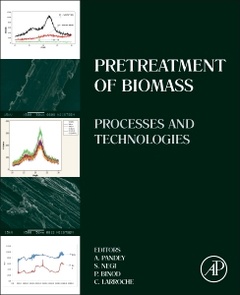Pretreatment of Biomass Processes and Technologies
Coordonnateurs : Pandey Ashok, Negi Sangeeta, Binod Parameswaran, Larroche Christian

Pretreatment of Biomass provides general information, basic data, and knowledge on one of the most promising renewable energy sources?biomass for their pretreatment?which is one of the most essential and critical aspects of biomass-based processes development. The quest to make the environment greener, less polluted, and less hazardous has led to the concept of biorefineries for developing bio-based processes and products using biomass as a feedstock. Each kind of biomass requires some kind of pretreatment to make it suitable for bioprocess. This book provides state-of-art information on the methods currently available for this.
This book provides data-based scientific information on the most advanced and innovative pretreatment of lignocellulosic and algal biomass for further processing. Pretreatment of biomass is considered one of the most expensive steps in the overall processing in a biomass-to-biofuel program. With the strong advancement in developing lignocellulose biomass- and algal biomass-based biorefineries, global focus has been on developing pretreatment methods and technologies that are technically and economically feasible. This book provides a comprehensive overview of the latest developments in methods used for the pretreatment of biomass. An entire section is devoted to the methods and technologies of algal biomass due to the increasing global attention of its use.
1. Introduction
2. Analysis of lignocellulosic biomass using infra-red methodology
3. Acidic treatment
4. Alkaline treatment
5. Hydrothermal treatment
6. Steam Explosion
7. Ozonolysis
8. Ionic liquids treatment
9. Microwave treatment
10. Torrefaction
Section B: Algal biomass
11. Physical treatments
12. Chemical treatments
Chemical engineers, biotechnologists, microbiologists/biologists, agricultural chemists, environmental engineers, petroleum engineers and graduate and postgraduate students in these areas. The main interest of this group is research and development of new processes and they are located in research labs in A&G and industry.
Professor Pandey is Adjunct/Visiting Professor/Scientist in universities in France, Brazil, Canada, China, Korea, South Africa, and Switzerland and also in several universities several in India. He has ~1425 publications/communications, which include 16 patents, 90 books, >700 papers and book chapters, etc with h index of 105 and ~48,800 citations (Goggle scholar). He has transferred several technologies to industries and has done industrial consultancy for about a dozen projects for Indian/international industries.
Professor Pandey is the recipient of many national and international awards and honours, which include Highest Cited Researcher (Top 1% in the world), Clarivate Analytics, Web of Science (2020, 2019 & 2018); Top scientist in Biotechnology (#1 in India and #8 in the world), Stanford University world ranking (2020); Fellow, World Society of Sustainable Energy Technologies?(2020); Fellow, Indian Chemical Society (2020); Distinguished Scientist, VDGOOD Professional Association, India (2020); Distinguished Professor of Eminence with global impact in the area of Biotechnology, Precious Cornerstone University, Nigeria (2020); IconSWM Life-time Achievement Award 2019, Internatio
- Provides information on the most advanced and innovative pretreatament processes and technologies for biomass
- Covers information on lignocellulosic and algal biomass to work on the principles of biorefinery
- Useful for researchers intending to study scale-up
- Provides information on integration of processes and technologies for the pretreatment of biomass
Date de parution : 09-2014
Ouvrage de 272 p.
19x23.3 cm
Mots-clés :
algal biomass; physical pretreatment; chemical pretreatment; thermo-chemical pretreatment; biochar; ABE fermentation; agroindustrial residues; algae; anaerobic; anaerobic fermentation; applications; autotrophy; bioaugmentation; biobutanol; biochemicals; biodiesel; bioethanol; bioethanol production; biofuel; biofuels; Biohydrogen; biomass; biomass cogeneration; Bio-oil; biophotolysis; bioprocess; bioreactor; biorefinery; biorefining; butanol; Carbon credits; cellulase; cellulase market; cellulases; challenges and perspectives; chemical hydrolysis; classification; climate change; clostridium; dark fermentation; economics analysis; energy balance; enzymatic hydrolysis; enzyme bioreactor; esterification/transesterification; Fast pyrolysis; fatty acid methyl esters; free fatty acids; gasification; granule; green diesel; greenhouse gas balance; growth; hemicellulases; hemicellulose structure; heterotrophy; hydrocarbon; hydroesterification; hydrogen production; hydrolysis; hydrothermal liquefaction; life-cycle analysis (LCA); life-cycle assessment; lignocellulose; lignocellulosic biomass; lignocellulosic ethanol; lignocellulosic feedstocks; lipase; lipid; mass scale; mass transfer; microalgae; microbial catalysts; microbial fuel cell; modeling; multiplicity; oil refinery; pathways; photobioreactor; photofermentation; polyhydroxyalkanoates (PHA); pretreatment; process conditions; processing; production; pyrolysis; renewable; renewable fuels; sludge; solar; solvent production; supercritical fluids; syngas fermentation; target costing; technoeconomic; Techno-economic assessment; thermochemical conversion; thermophiles; toxic compounds; transesterification; value engineering; value-based approach; waste oils; wastewater treatment



